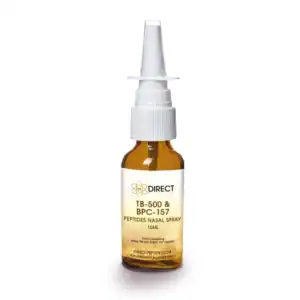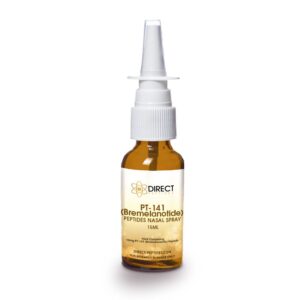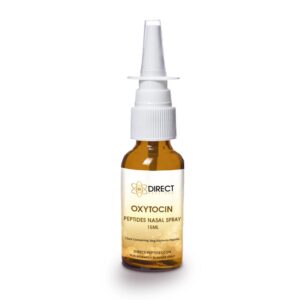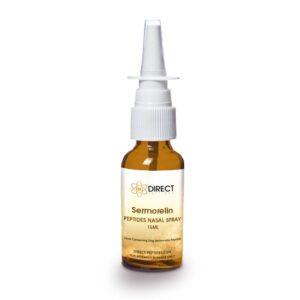Peptide nasal sprays are advancing research in new and exciting ways. These sprays deliver peptides directly to biological systems in a unique, efficient, and non-invasive manner.
They are made for research use only and avoid traditional methods like injections or oral administration. These traditional methods often have problems with effectiveness and compliance.
Peptide nasal sprays are precise and targeted, making them key tools for studying complex biological processes. They also help create new therapeutic approaches.
This article looks at the science behind peptide nasal sprays. It explains how nasal delivery works and explores their groundbreaking uses in neuroscience, metabolism, and regenerative medicine.
Peptide nasal spray works by delivering peptides directly into the nasal cavity, where they can be rapidly absorbed into the bloodstream. Peptides can then exert their effects on various physiological functions, making this method an efficient and targeted way to introduce therapeutic peptides into the body.
Peptides are short chains of amino acids that are essential for regulating biological processes. These molecules are key to many functions in the body, such as cell communication, immune responses, and tissue repair.
Studying peptides has created new opportunities to understand diseases and develop therapies. However, delivering peptides to specific target sites is challenging. This is because they are prone to degradation and require precise conditions for absorption.
Peptides are used in research to:
Nasal delivery systems have changed how peptides and small molecules are administered in research. Nasal sprays are non-invasive and direct, allowing fast and effective delivery of a single dose. This method avoids issues like enzymatic breakdown in the digestive tract and the need for invasive procedures.
The nasal cavity has tissues rich in blood vessels, such as the nasal mucosa and olfactory epithelium. These tissues allow peptides to be absorbed into the bloodstream or cerebrospinal fluid (CSF). Nasal sprays can bypass the blood-brain barrier (BBB), making them an important tool for studying central nervous system (CNS) disorders.
PT-141, or Bremelanotide, is studied a lot for how it affects the central nervous system (CNS) and the posterior pituitary. Saudia Arabia Researchers look at how it changes receptor activity, boosts neurotransmitter release, and affects behavior.
It might also improve blood flow. PT-141 is being studied to see if it can reduce stress and improve mood.
For more information, please visit the PT-141 category page.
TB500 and BPC are known for their strong regenerative properties.
These peptides are studied for how they help repair tissues, lower inflammation, and boost immune responses.
Their potential to help spinal cord healing and protect nerves makes them important in regenerative medicine research.
Oxytocin is known as the “bonding hormone” and is studied for its role in social cognition, social behavior, emotions, and stress. A randomized controlled trial tested oxytocin nasal sprays to see if they reduce repetitive behaviors. The sprays may also help improve brain plasticity in the hippocampus, which is important for memory and learning.
For more information, please visit the Oxytocin category page.
Sermorelin, a synthetic peptide, has shown promise in cognitive studies. It is being researched for its ability to improve memory, enhance learning capabilities, and support hippocampal synaptic plasticity and function.
Sermorelin is also being explored as a potential intervention for age-related cognitive decline.
For more information, please visit the Sermorelin category page.
Peptide nasal sprays are changing neurological research. They provide an easy way to study cognitive decline, neurodegeneration, and CNS disorders.
Alzheimer’s disease causes memory loss and problems with thinking in older adults. Scientists are studying peptides like VIP (vasoactive intestinal peptide) and VIP nasal spray to see if they can help. These may improve how brain cells communicate, lower inflammation, and bring back normal brain function. Research with nasal sprays has shown good results in slowing the disease in mouse models.
Peptides are being tested in Parkinson disease research to protect neurons, control motor symptoms, and improve neurotransmitter balance. Nasal delivery systems help target the affected areas. This approach gives new insights into lowering disease symptoms and slowing progression with smaller doses.
Severe seizures happen when neurons have too much electrical activity, which can cause neuronal damage. Peptide nasal sprays are being tested to study how ion channels work and to stop neurons from becoming too active. The goal is to lower the neurons’ excited state and find treatments that can change the strength of electrical signals.
Peptides delivered through nasal sprays are being studied for their effects on metabolism and weight control. Research focuses on:
TB500 and BPC nasal sprays are key in regenerative research. Saudia Arabia Scientists are studying how they help the immune system and repair tissues. These sprays may help with conditions like chronic inflammation and acute injuries.
Research shows these peptides might help fix damaged spinal cords. Saudia Arabia Studies look at how they support nerve growth and connections.
Scientists are testing NGF nasal sprays to repair nerves and grow new ones. This could help treat diseases like Alzheimer’s and Parkinson’s.
Intranasal peptide absorption uses the unique structure of the nasal cavity. When peptides are given through nasal sprays, they meet the nasal mucosa, which has many blood vessels. This helps the peptides get into the bloodstream quickly.
The nasal epithelium has special cells that can move peptides across cell membranes. This avoids problems that block absorption through oral or injected methods. TRP channels in the nasal passage also help these molecules get into the body faster, giving quick effects.
Since this method skips first-pass metabolism, it increases the amount of peptides that stay active. It also lowers the chance of enzymatic breakdown, making sure more of the active compounds reach the target areas in the body. Knowing this process helps in creating better peptide formulations and improving their use in research.
Peptide nasal sprays are useful in research, but their safety and side effects must be considered. One concern is the risk of local irritation, which may cause nasal congestion, burning, or discomfort.
These symptoms are usually mild and temporary, but researchers should monitor them. Less common side effects include headaches, dizziness, or allergic reactions, so thorough evaluations are needed before starting studies with peptides.
The formulation and purity of peptides in these sprays are important for safety and effectiveness. Following strict quality control is essential to reduce side effects and ensure reliable results. While peptide nasal sprays are a promising tool in research, understanding their safety and side effects is crucial for responsible use.
The long-term safety and effectiveness of peptide nasal sprays are important factors that researchers need to study to confirm their use for a long time in science and therapy.
Current studies are revealing possible risks from extended peptide use, such as immune system responses or changes in nasal tissue health.
To protect patients and study participants, detailed research into both local and overall effects is needed for cognitive performance, especially regarding how repeated doses affect the body over time.
Moreover, the way peptides work in the body when delivered by nasal sprays is being actively studied. Understanding how these peptides act in the body over longer periods helps explain their stability, metabolism, and how long their effects last.
It is also necessary to explore how better formulations and delivery methods can improve effectiveness while lowering risks. As peptide research advances, a complete safety profile will be vital for safely using nasal sprays in clinical studies and possible treatments.
Peptide nasal sprays and topical applications are innovative ways to deliver peptides. Each has its own benefits and challenges when it comes to how well they work, how they are absorbed, and how they are used in research. Peptide nasal sprays are absorbed quickly through the nose, which has many blood vessels.
This avoids the digestive system, which can break down peptides and make them less effective. As a result, researchers can achieve better absorption and faster effects, especially in studies on brain and nervous system disorders.
On the other hand, topical applications deliver peptides directly to a specific area, which is useful for skin problems or surface-level conditions. While this method can work well, it often faces challenges with how easily peptides can pass through the skin and into the body. Also, topical applications may take longer to show effects compared to nasal sprays.
In the end, the choice between these two methods depends on the research goals, how quickly results are needed, and where the peptide needs to work.
A key challenge in peptide research is keeping peptides stable during storage and effective during delivery. New formulation technologies are solving these problems, helping peptides stay usable.
Peptide nasal sprays are only for research use. Saudia Arabia Researchers must follow strict ethical rules to use them responsibly and meet regulatory requirements.
Consistent dosing is very important for reproducible results. New nasal spray technologies aim to deliver exact peptide amounts with less variation.
Emerging technologies are improving how nasal delivery systems work. These advancements include:
As peptide research grows, nasal sprays may be used for:
Ongoing studies aim to turn research on peptide nasal sprays into clinical use. This connection between research and therapy could help solve complex conditions with innovative solutions.
Peptide nasal sprays have changed scientific research. They offer a simple, quick, and accurate way to deliver peptides. This helps researchers study complex biological systems more easily.
From helping with CNS research to understanding metabolic pathways and making progress in regenerative medicine, peptide nasal sprays are creating new opportunities in science.
As technology and ethics improve, their role in new discoveries and treatments will grow. They are becoming an important tool in modern research.
[1] Hardy JG, Lee SW, Wilson CG. Intranasal drug delivery by spray and drops. J Pharm Pharmacol. 1985 May;37(5):294-7.
[2] Molinoff PB, Shadiack AM, Earle D, Diamond LE, Quon CY. PT-141: a melanocortin agonist for the treatment of sexual dysfunction. Ann N Y Acad Sci. 2003 Jun;994:96-102.
[3] Maar K, Hetenyi R, Maar S, Faskerti G, Hanna D, Lippai B, Takatsy A, Bock-Marquette I. Utilizing Developmentally Essential Secreted Peptides Such as Thymosin Beta-4 to Remind the Adult Organs of Their Embryonic State-New Directions in Anti-Aging Regenerative Therapies. Cells. 2021 May 28;10(6):1343.
[4] Magon N, Kalra S. The orgasmic history of oxytocin: Love, lust, and labor. Indian J Endocrinol Metab. 2011 Sep;15 Suppl 3(Suppl3):S156-61.
[5] Prakash A, Goa KL. Sermorelin: a review of its use in the diagnosis and treatment of children with idiopathic growth hormone deficiency. BioDrugs. 1999 Aug;12(2):139-57.
[6] Ozsoy Y, Gungor S, Cevher E. Nasal delivery of high molecular weight drugs. Molecules. 2009 Sep 23;14(9):3754-79.
Nasal Sprays are available Online from Direct Peptides Saudia Arabia. Peptide Nasals offer a convenient alternative to researching peptides without the use of injections.

TB500 BPC157 Blend Nasal Spray
£85.00 – £165.00Price range: £85.00 through £165.00 Select options This product has multiple variants. The options may be chosen on the product page
PT-141 (Bremelanotide) Nasal Spray
£29.45 – £53.90Price range: £29.45 through £53.90 Select options This product has multiple variants. The options may be chosen on the product page
Oxytocin Nasal Spray
£20.64 – £36.29Price range: £20.64 through £36.29 Select options This product has multiple variants. The options may be chosen on the product page
Sermorelin Nasal Spray
£24.54 – £44.08Price range: £24.54 through £44.08 Select options This product has multiple variants. The options may be chosen on the product pageALL CONTENT AND PRODUCT INFORMATION AVAILABLE ON THIS WEBSITE IS FOR EDUCATIONAL PURPOSES ONLY.
DISCLAIMER: These products are intended solely as a research chemical only. This classification allows for their use only for research development and laboratory studies. The information available on our Saudia Arabia Direct Peptides website: https://direct-peptides.com is provided for educational purposes only. These products are not for human or animal use or consumption in any manner. Handling of these products should be limited to suitably qualified professionals. They are not to be classified as a drug, food, cosmetic, or medicinal product and must not be mislabelled or used as such.